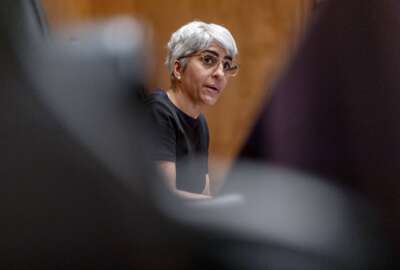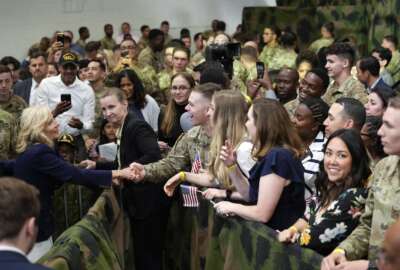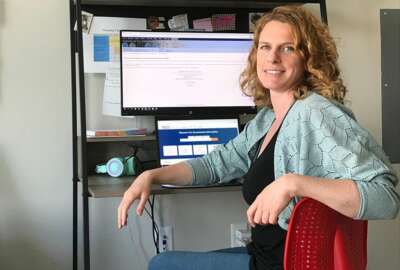A fresh effort to help overseas military spouses work federal jobs remotely
A new agreement between the Defense and State Departments aims to help military spouses living with service members overseas to get the ok to work remotely.
A new agreement between the Defense and State Departments aims to help military spouses living with service members overseas to get the ok to work remotely for eligible federal positions. To learn more, Federal News Network’s Eric White spoke to the Deputy Assistant Secretary of Defense for Military Community and Family Policy, Patricia Barron, on the Federal Drive with Tom Temin.
Interview Transcript:
Patricia Barron What I can tell you is that the DETO program operated under an interim agreement between the DoD and the State Department since last July of 2022, actually. So, the interim agreement, it was only a desire to bridge the gap until both departments would be able to create a more permanent agreement that could replace it. And we’ve really been working hard on that for the almost the past year, in partnership with the State Department and the First Lady’s Joining Forces team. We took the opportunity to apply the lessons learned that we had from the interim agreement and strengthen the DETO program to better serve our military community. So, I could I guess you could say that it was, it was an effort between the Department of State, the Department of Defense, and the First Lady’s Joining Forces team. But really, the secretary of Defense, Secretary Austin, I had already made taking care of people one of his top priorities. And under that priority, economic security and military spouse employment was a highlight. And so, this fit, right? Right into the teacup, as we like to call it, priority that the secretary had provided. One of the things that’s important about this agreement is that it allows military spouses to keep their federal jobs and telework when assigned overseas, because it’s so critical to their economic security, as you mentioned in your intro. You know, we do move around a lot. And I know I myself moved 14 times in 30 years. And what this DETO agreement does is it allows the federal employee who’s assigned to a domestic position to telework at an approved overseas work site for a limited period of time. So, you really have to have, the service member has to have orders where they can have an A company tour and that, and the remote employee employment is available or, they have the opportunity to do that.
Eric White Gotcha. Okay. And so how can military partners utilize this new agreement to help themselves find work when they are living with the service member who is, serving overseas or, you know, one of the bases across the U.S..
Patricia Barron So what does a spouse do when they get PCS’s orders? You know, they’re employed by our federal agency. They’re either a military spouse or a DoD civilian spouse. What do they do? The first thing they have to do is go talk to their supervisor to find out if remote work is even an option. Not all, you know, not all positions are. So once the spouse and the supervisor, do come to an agreement that they can indeed work remotely, then you start the DETO process. And to find out more about that, you can go to, military one source and type and DETO in the search rectangular box and it’ll come up and it’ll kind of give you the Q and A on what you need to do to kind of start the process. It’s not a guaranteed, approval, but it this agreement has made it much easier for there to be a hopefully an approval so that the spouse can work remotely overseas.
Eric White Gotcha. And so, we cover a lot of programs with, acronyms here at Federal News Network. But I’d be remiss if I didn’t ask you to define what is the DETO program.
Patricia Barron That’s a that’s really great. Thank you. So DETO stands for Domestic Employees Teleworking Overseas. And really what it is, is the State Department has the responsibility to make sure that that our federal employees are secure and safe when they are overseas. And, and by making sure that all, all the processes that they require to be able to work overseas are in place, then you can have a DETO agreement that legally allows you to work overseas for the federal government.
Eric White Okay. And so, within this agreement, what role I guess, would the State Department be playing then? You know, you all are giving the assistance in reaching out and, you know, making sure that military spouses know about this. You know, what does the State Department get out of this?
Patricia Barron Yeah. Well, consider the fact that there are probably military spouses that work for the State Department. And, and if they get orders to go overseas, they don’t lose an employee. They, they get to keep that very well-trained employee and, and to, to continue to, you know, serve for them. But the other thing that it does is that the memorandum of agreement, one of the beauties of it, is that it really did simplify the process for being able to say yes, but there’s an awful lot of intricacies in the memorandum. I won’t go into them, but what it does is it allows for the State Department to make sure that those employees are safe and secure, and it allows for that military spouse or DoD civilian spouse to continue with their career progression, which is a win for everybody.
Eric White Understood. Okay. And so, with, you know, the increase in remote work inside and outside of government. Has that made it easier for military spouses to A. Find work or B. Keep jobs when they do move?
Patricia Barron We hope so, Eric. That certainly is our goal, because I would say that before Covid, remote work wasn’t as popular, people just didn’t really kind of think that it was something that was very doable. However, Covid taught us that it was indeed very doable and actually was a great way to retain employees. So, I really do feel that with the increase of remote work across the country, certainly within the department as well, we do find more opportunities for military spouses to find remote work, which is great.
Eric White We’re speaking with Patricia Barron. She is deputy assistant secretary of defense for military, community and family Policy. So, this has been a big, priority for, many administrations and the DoD as a whole. You know, are there other efforts that include other partnerships that you all are seeking out? You know, it could be with other agencies or other organizations, to help with this cause of making sure that military spouses are able to find work.
Patricia Barron That is something that we, especially at military, community and family policy have been very keen on for many, many years. You’re right. And I would say that besides this, amazing memorandum of agreement with the Department of State, we also have within the DoD many, resources and opportunities for military spouses to find employment. I would say for any spouse, whether there are here within the United States or overseas, the first place, they should look at the as at the local installation level, many installations have something called the Employment Resource Program, which is an office on the installation where they can go get support on resume building, get support on interview tactics, but most importantly, be connected to those local employers, to hopefully find employment. But if you, don’t really find that that’s helpful to you because you’re looking more broadly or it just isn’t a good fit for you, you can always go to the department, spouse, education and career opportunities. We like to call it SECO. You know how the DoD loves their acronyms. The SECO program provides high quality access to numerous and virtual initiatives that allows, a spouse to access anywhere that they, that they are. It’s done through the military one source website, and that is a 365/24/7, a website where we, answer phones, answer chat. You can find information through the, the website, via your computer. And it provides you with all sorts of resources. But most importantly, the SECO program provides you with career coaches. No kidding. Certified career coaches that will work with you free of charge to help you, find the type of employment that you need. Now, let’s say that you are wanting employment and you’re overseas and you just can’t find it. One of the things that we like to encourage spouses to do is to still engage with the CEO, career coaches, or the SECO program to think about upskilling, you know, adding more skills to your resume, thinking about maybe adding, more education or more or really refine your resume in order to get hit the ground running when you get back to, to the United States. If I may, I’d like to give you that, that website, that would be my school website, which is the one stop access point for multiple resources and tools and information. So, visit my SECO military one source.mil and you’ll find all that you need there at a really great, website.
Eric White Yeah, we’ll make sure to include a link of it on our website as well. Turning the spotlight a little bit back on you for a second, I had picked something up, you know, mentioning all the time that you had move. Were you yourself a military spouse or, what was your background? And, you know, how did you find yourself supporting this cause in the DoD?
Patricia Barron Yeah, I am a military spouse. My husband was active duty for 30 years. We met in college, and therefore I was along for the entire 30-year ride and, raised three kids in the military community. What I could say is that very typical of military spouses. I was a jack of all trades and, you know, master of none, because I had to reinvent my myself everywhere that I went, starting out as a registered nurse, every time I went to a different state, I had to get a different license, but eventually found myself in advocacy because I felt so strongly about the challenges that, myself and my colleagues went through as military family members. I wanted to do what I could to make it better for the next generation of military spouses. And that’s how I found myself here.
Copyright © 2024 Federal News Network. All rights reserved. This website is not intended for users located within the European Economic Area.
Eric White is news anchor and Federal Drive producer at Federal News Network.
Follow @FEDERALNEWSCAST







